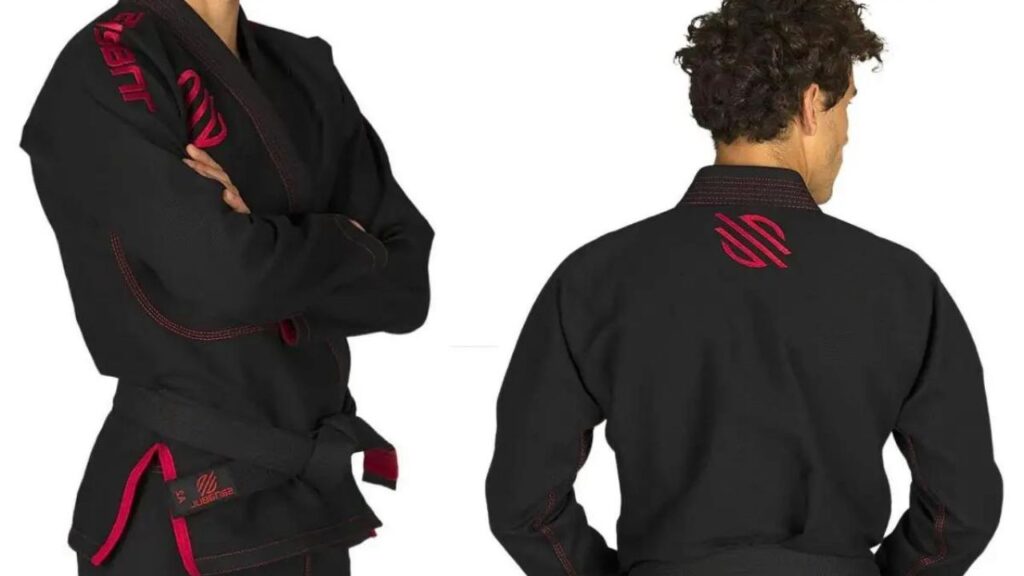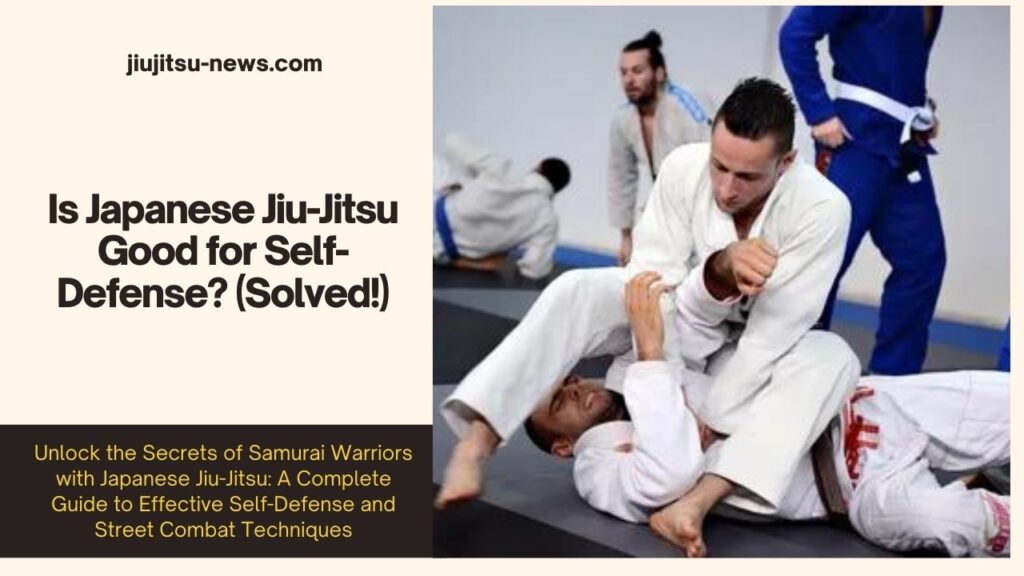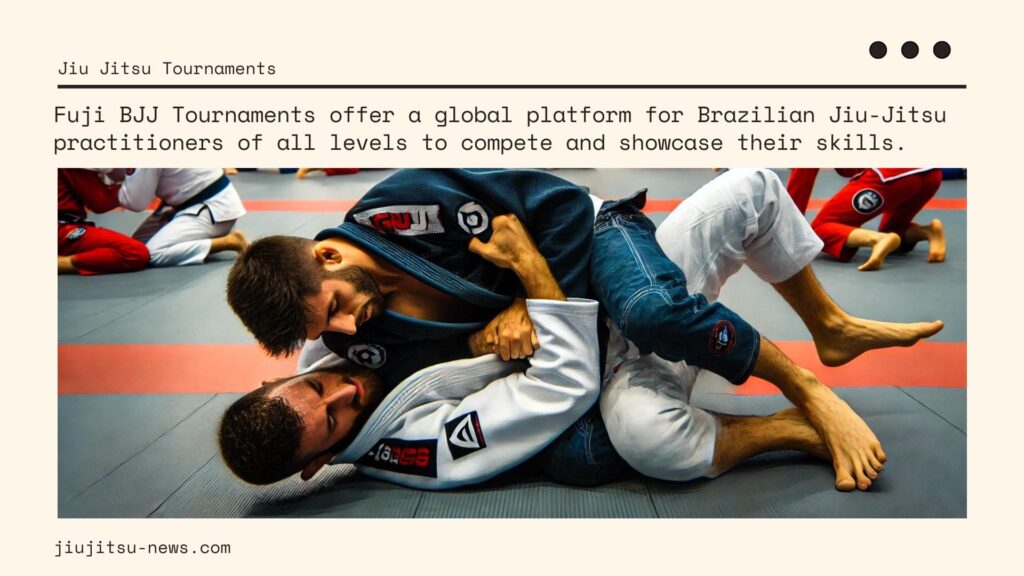
Are you looking for a way to elevate your Brazilian Jiu-Jitsu skills and challenge yourself against some of the best in the sport? Fuji BJJ Tournaments are highly acclaimed in the BJJ community and present a unique opportunity for amateur and professional grapplers.
These tournaments are structured to accommodate a broad spectrum of participants, allowing them to demonstrate their prowess and refine their techniques under the authentic pressures of competitive combat.
Whether stepping onto the mat for the first time or looking to assert your dominance, Fuji BJJ Tournaments provide the perfect stage to test your skills and push your limits. Continue reading for more!
2024 Fuji Tournament Events
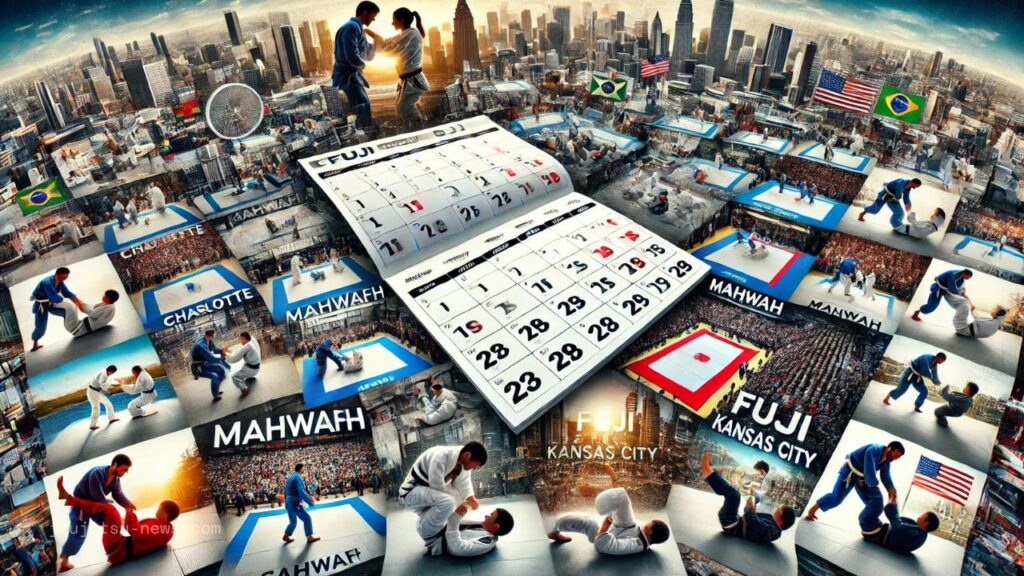
Understanding Fuji BJJ Tournaments is crucial if you’re interested in Brazilian Jiu-Jitsu.
These events are organized into divisions by weight, skill level, age, gender, and rank to ensure fairness.
Below is an overview of the 2024 Fuji Tournaments, designed to provide a platform for competitors to showcase their skills.
| Date | Event Name | Location |
|---|---|---|
| July 12 | Judo for BJJ Seminar | Charlotte |
| July 13 | Charlotte Open | Charlotte, NC |
| July 14 | NY/NJ Summer Open | Mahwah, NJ |
| July 14 | Wilmington Summer Championship | Wilmington, NC |
| July 20 | Kansas City Summer Open | Kansas City, Missouri |
| July 20 | Pittsburgh Summer Championship | Monroeville, PA |
| July 20 | Knoxville Summer Championship | Dandridge, TN |
| July 27 | Madison Summer Open | Verona, WI |
| August 3 | Philadelphia Summer Championship | Downingtown, PA |
| August 3 | Northern Ohio Championship | Sandusky, OH |
| August 10 | Grand Rapids Summer Championship | Grand Rapids, MI |
| August 11 | Albany State Championship | Delmar, NY |
| August 17 | Fort Wayne Summer Championship | Fort Wayne, IN |
| August 17 | Port Lucie Summer Championship | Vero Beach, FL |
| August 24 | Terre Haute Summer Championship | Terre Haute, IN, USA |
| August 24 | Fayetteville Fall Championship | Fayetteville, NC |
| September 7 | Springfield, IL Fall Open | Springfield, IL |
| September 7 | Cincinnati Fall Championship | Hamilton, OH |
| September 14 | Kentucky State Championship | Bowling Green, KY |
| September 21 | Chicago Fall Open | Barrington, IL |
| September 21 | Ft Myers Summer Championship | Fort Myers |
| September 22 | Massachusetts Fall Open | Fitchburg, MA |
| October 5 | Quad Cities Open | Bettendorf, IA |
| October 5 | Indianapolis Fall Championship | Noblesville, IN |
| October 5 | Virginia Beach Fall Championship | Virginia Beach, VA |
| October 12 | Allentown Fall Championship | Allentown, PA |
| October 12 | St. Louis Fall Classic | St Louis, MO |
| October 19 | Wisconsin State Championships | Milwaukee, Wisconsin |
| October 19 | Auburn Fall Championship | Opelika, AL |
| October 19 | Charleston Fall Championship | Hurricane, WV |
| October 26 | Raleigh Fall Championship | Raleigh, NC |
| November 16 | Cincinnati Winter Championship | Hamilton, OH |
| November 23 | Springfield, MO Fall Open | Springfield, MO |
| December 7 | Allentown Winter Championship | Allentown, PA |
| December 14 | Pittsburgh Winter Championship | Monroeville, PA |
FUJI Tournaments Divisions
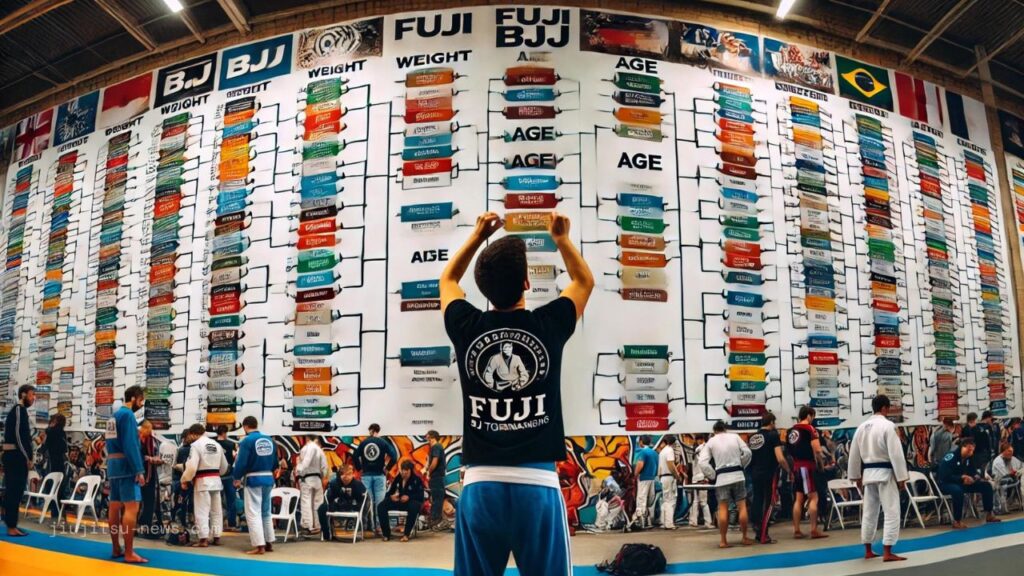
FUJI divides its competitors into several categories by competitor’s weight, skill level, age, gender, and rank.
They are committed to putting each contender in the most appropriate bracket.
Men Adult/Masters/Executive
Adult male contestants in the various FUJI BJJ Tournaments are grouped into seven weight divisions ranging from 0 to over 216 pounds (0 to over 98 kg), as described below:
| Men Competitor’s Weight Class | Weight Limit in Pounds | Weight Limit in Kilograms |
|---|---|---|
| Strawweight | 0 to 140 lbs | 0 to 63.9 kg |
| Flyweight | 141 to 155 lbs | 64 to 70.9 kg |
| Lightweight | 156 to 170 lbs | 71 to 76.9 kg |
| Welterweight | 171 to 185 lbs | 77 to 83.9 kg |
| Middleweight | 186 to 200 lbs | 84 to 90.9 kg |
| Heavyweight | 201 to 215 lbs | 91 to 97.9 kg |
| Unlimited | Over 216 lbs | Over 98 kg |
Women Adult/Masters/Executive
Adult women contestants in the various FUJI Tournaments are separated into four weight classes ranging from 0 to over 150 pounds (0 to over 68 kg), as described below:
| Men Competitor’s Weight Class | Weight Limit in Pounds | Weight Limit in Kilograms |
|---|---|---|
| Flyweight | 0 to 115 lbs | 0 to 52.4 kg |
| Lightweight | 116 to 130 lbs | 52.5 to 58.9 kg |
| Welterweight | 131 to 150 lbs | 59 to 67.9 kg |
| Heavyweight | Over 150 lbs | Over 68 kg |
Adult GI Skill Divisions
In Gi BJJ FUJI events, competitors are classified into five skill groups, as shown in the table below.
| Gi Competitor’s Skill Division | Divison’s Criteria |
|---|---|
| Novice White Belt | BJJ white belt practitioners under six months on the mat. |
| Advanced White Belt | BJJ practitioners over six months on the mat. |
| Blue Belt | BJJ practitioners who achieved the blue belt rank. |
| Purple Belt | BJJ practitioners who achieved the Purple Belt rank. |
| Brown/Black Belt | BJJ practitioners who have the brown or black rank. |
Adult No-Gi Skill Divisions
In No-Gi BJJ FUJI competitions, competitors are classified into three skill groups, as shown in the table below.
| No-Gi Competitor’s Skill Division | Divison’s Criteria |
|---|---|
| Beginner | Competitors under one year of jiu-jitsu training have no prior wrestling experience. |
| Intermediate | Competitors with over one year and less than three years of Jiu-Jitsu training. |
| Expert | Competitors have over three years of jiu-jitsu training and competition experience. |
Fuji BJJ Adult Age Divisions
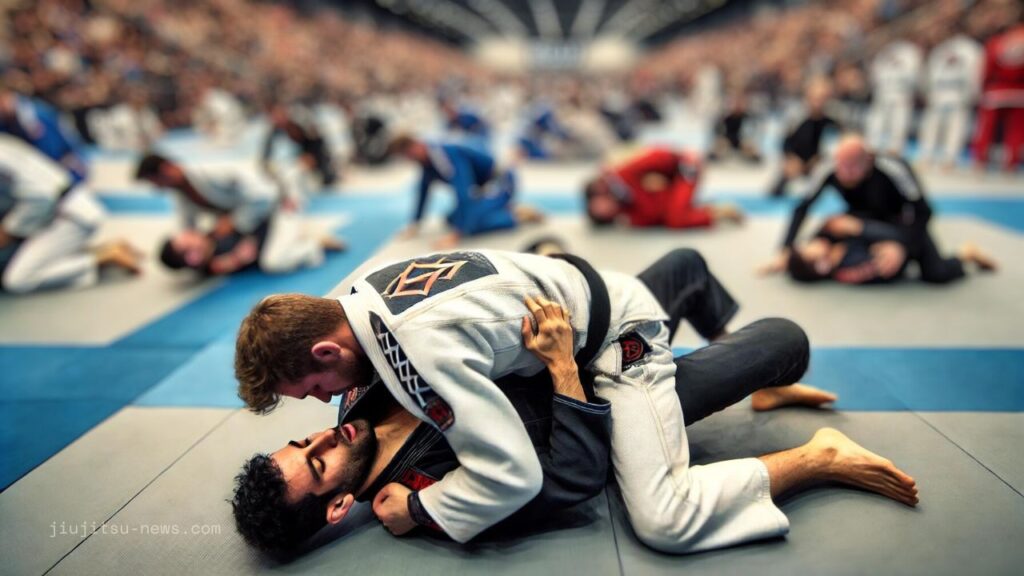
In addition to the skill category, FUJI events divide their contestants into many age divisions, as illustrated in the table below.
| FUJI Age Division | Age Limit |
|---|---|
| Adult (men and women) | Competitors aged between 18 and 29 |
| Masters (men and women) | Competitors aged between 30 and 45 |
| Executives (men and women) | Competitors aged over 46 |
Children and Teen Divisions
FUJI BJJ provides fair competition for all youth competitors by carefully evaluating aspects like age, weight, and rank. They focus on children’s safety. Thus, they take the bracketing procedure very seriously.
Here are the different FUJI Jiu Jitsu tournament categories for children:
- Beginner: Youth competitors with less than one year of training experience or have competed in less than four events. In this division, they will be partnered with opponents weighing little more than 10 pounds.
- Intermediate: Youth competitors with 1 to 4 years of training experience. In this category, the weight differential between opponents is restricted to 10 pounds for youngsters aged 5 to 12 and 15 pounds for those aged 13 and above.
- Expert: Youth Competitors with an exceptional level of training and competitive experience. The weight differential between opponents is limited to 15 pounds for youngsters aged 5 to 12 and 20 pounds for those aged 13 and above.
Fuji Tournament Rules and Regulations
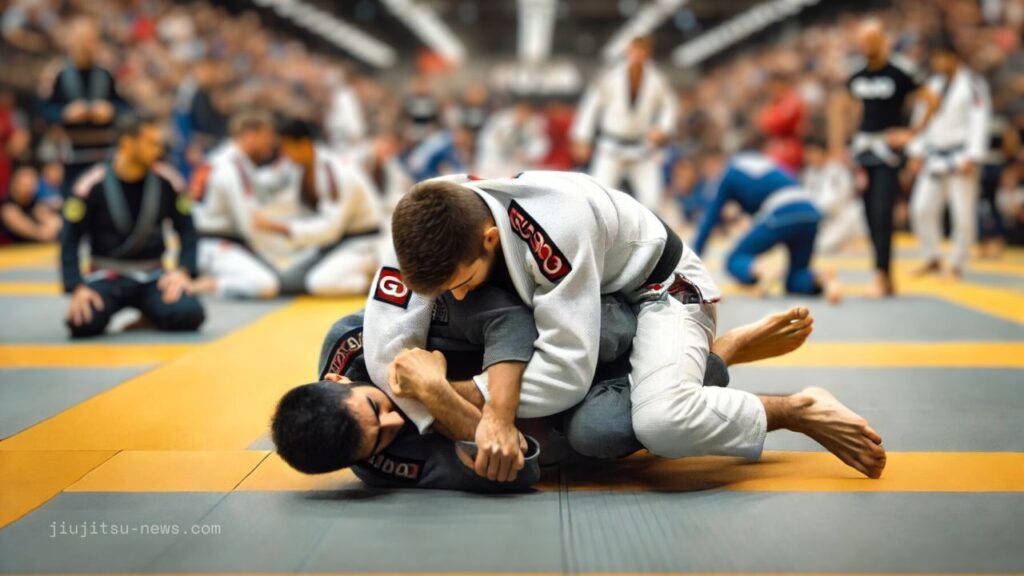
Fuji has solid rules and regulations to ensure fair and safe competition events. The following are some standards that FUJI tournament Competitors must obey.
General Rule
Fuji BJJ Tournaments operate under strict rules to ensure fairness and safety.
Matches are designed to have definitive outcomes, with victory achievable through submissions, points, referee decisions, disqualifications, or competitor injuries.
Point System
In Fuji tournaments, points are awarded for control positions and successful techniques, such as 4 points for achieving mount or back control with hooks.
This system encourages competitors to strive for technical excellence and match control.
| Technique or Position | FUJI Scoring System |
|---|---|
| Mount, | 4 points |
| Back control with hooks | 4 points |
| Passing the guard | 3 points |
| Takedown | 2 Points |
| Sweep | 2 Points |
| Knee-On-Belly | 2 Points |
| Submission attempts that go beyond the mat without apparent reason. | 2 Points |
Submission and Conduct Rules
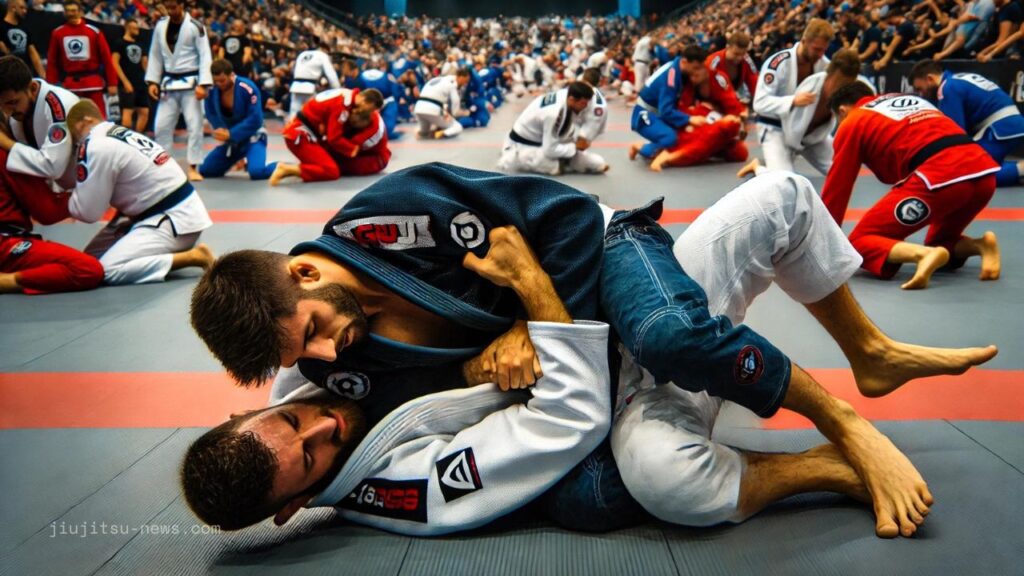
Victory by submission can be declared through physical tapping or verbal submission.
Moreover, competitors’ conduct is highly regulated, with disqualifications for dangerous or unsportsmanlike actions, such as striking or eye gouging.
Overtime Rules
To decide a winner in the event of a draw, Fuji tournaments employ a one-minute sudden-death overtime, in which the first to score wins.
If the match is still tied, the outcome is determined by the competitor who demonstrated greater aggression in seeking positional advancements and submission attempts.
Faults, Warnings, and Disqualifications
Faults such as illegal grips or fleeing the match area lead to warnings and potential disqualification if repeated.
This system reinforces the importance of sportsmanship and adherence to the rules.
| Foul | Description |
|---|---|
| Eye Gouging | Prohibited use of fingers, other body parts, or objects to squeeze or tear the eye. |
| Striking | Delivering a strike using any body part (e.g., fist, elbow, knee) is forbidden. |
| Minor Joint Manipulation | Handling of three or more digits simultaneously is required; single-digit manipulation is banned. |
| Hair Yanking | Pulling hair or using it to control an opponent is not allowed. |
| Biting or Spitting | These actions are strictly prohibited. |
| Fish Hooking | Inserting fingers to stretch the skin of the opponent’s face (lips, nose, ears) is banned. |
| Slamming and Spiking | Illegal to slam or spike an opponent on their head or neck from the guard or during a takedown. |
| Scissor Takedowns | This maneuver is prohibited. |
| Disrespectful Behavior | Actions showing disrespect towards referees, opponents, or spectators are not allowed. |
| Post-Match Attacks | Attacking an opponent after the match has concluded is forbidden. |
| Back Arch Takedowns | This type of takedown is prohibited. |
| Attacking During Treatment | Attacking an opponent under the care of a referee or doctor is prohibited. |
| Clavicle Grabbing | Prohibited. |
| Attacking During a Break | Engaging an opponent during a break is not allowed. |
Conclusion
Participating in Fuji BJJ Tournaments offers competitors a unique platform to test and enhance their skills, garner experience, and grow in Brazilian Jiu-Jitsu.
These events are more than just competitions; they celebrate skill, strategy, and the enduring spirit of BJJ.
See Also! Dive into our interactive IBJJF Divisions Quiz and challenge yourself on everything from age and weight classes to rank divisions. Start Quiz Now!

